NATO is a Farce, Part 4: Reviving Old Hatreds to Create New Conflict
Some NATO members are nursing long-standing grudges to drag Europe into an existential conflict with Russia.

For Russia, it’s a deadly deja vu
If you are Russian, you have seen this movie before: all of Europe is militarised, mobilised and united against you, calling for your destruction.
Only this time, Europe is not united under the black and red Swastika of the Third Reich, but rather the blue and white compass of NATO and — more recently — the star-spangled banner of the European Union.
NATO — and the European Union — appear to be hell-bent on going to war with Russia, and the provocations are escalating rapidly.
A new generation of Cold Warriors
This new wave of warmongering is spearheaded by a cabal of American catspaws — US puppets that I described in my previous NATO article, “NATO is a Farce, Part 2: The Puppet Parade”.
These “transatlanticists” include European Commission President Ursula Von der Leyen, as well as a host of national leaders, all of whom are united in one sinister enterprise: to subjugate the will and the well-being of their own people in pursuit of a globalist policy to extend American cultural, economic and military hegemony over the Eurasian continent.
Kallas, the Estonian Valkyrie
Kaja Kallas, the Prime Minister of Estonia who is set to become the EU’s head of Foreign Policy and Security, is a case in point. She is regarded as a “fierce critic” of Russia, which she openly calls “evil”.
Kallas is a second-generation politician whose father was former premier and EU commissioner Siim Kallas, a man who had also served as the governor of the newly independent Estonia’s central bank. She comes from a powerful family, and she is known for “punching above her weight” in the arena of EU politics.
In fact, she is now set to become the EU’s “High Representative for Foreign Policy and Security”, succeeding Spain’s Josep Borrell. In that position, Kallas will serve as the bloc’s chief diplomat and the closest thing the EU has to a Defence Minister.

Russophobia as a political platform
Kallas, however, is also a dedicated Russophobe who even expelled the head of the Estonian Russian Orthodox Church in January 2024. Then, in April, her government declared the Moscow-based Orthodox Patriarchate church itself to be a terrorist organisation.
Given Kallas’s strong anti-Russian positions and actions, one would never guess that 25% of Estonians are ethnic Russian. In fact, the Russian Estonians — like the Russian Latvians — have suffered persecution and discrimination since both countries became independent of the Soviet Union in 1991.
Given her deliberate alienation of the Russian population, it is not surprising that in a poll taken in December 2023, 71% of Estonians wanted Kallas to resign as PM. In fact, like so many EU officials, Kallas has “failed upward” by serving as a very unpopular national politician before being “rescued” and appointed to a European Union job in Brussels.
Ursula Von der Leyen, for example, was dogged by scandals and an ongoing investigation into misspending and mismanagement when she served as German Defence Minister before becoming EC President.
Fixed on the Past, blind to the Present
Kallas was born a Soviet citizen, and her mother and grandmother were forcibly deported to Siberia as part of a “collectivisation” program designed to quell resistance, punish Nazi collaborators, and make the Estonians into good Soviet citizens.
Kallas has never forgotten this, and appears unwilling to forgive and move on. She holds the modern day Russian Federation responsible for the misdeeds of the USSR, and she views Vladimir Putin as nothing more than a modern-day Stalin.
“Now 46 and prime minister since 2021, she is one of the most hawkish leaders in Nato when it comes to blunting the Kremlin’s ambitions in Europe. That has spooked some in the White House that she risks dragging the West into direct conflict with Moscow.”
It is now clear that such risks have grown and multiplied over the past year.
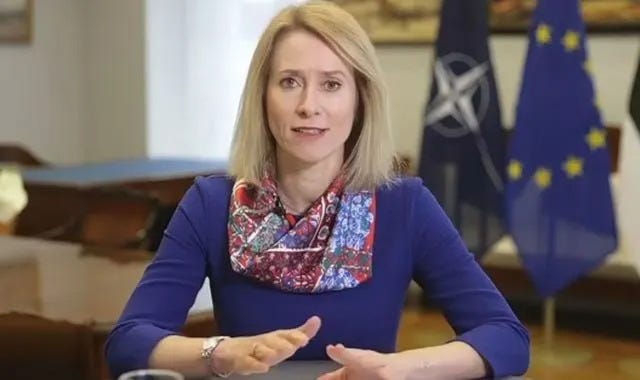
In my first article about NATO as a farce, I described how the “cowboy” US President George W. Bush was obsessed with building up the “Eastern Flank of NATO”. How the Bush Administration exprerssed disdain for what Bush’s Secretary of Defense, Donald Rumsfeld, referred to as “Old Europe” and instead were enchanted by what Rummy called “New Europe” — the former Soviet-dominated nations who had an earnest willingness — indeed, a passionate enthusiasm — to take on Russia.
The Russian incursion into Ukraine and the ensuing conflict has kept Eastern Europe especially in a state of constant panic.
Why the Baltics are so bellicose
Many — like me — believe that Kallas’s anti-Russia hatred is ultimately rooted in a “Nazistic” nationalism, and not just because of the privations visited upon the Baltic States by the Soviet Union in retaliation for their having allied with Hitler against the USSR in WWII.
In fact, Latvia and Estonia both signed treaties with Hitler in June 1939. No wonder then that Estonia, like Ukraine, had its own Nazi “Waffen SS” division during the war. And the the Latvians were so pro-Nazi that they even had two SS divisions, which are still celebrated to this day.

All of the Baltic States welcomed the invading Nazis as “liberators” from Soviet rule. And although the USSR has been extinct for decades, Russophobia is still rampant in these states.
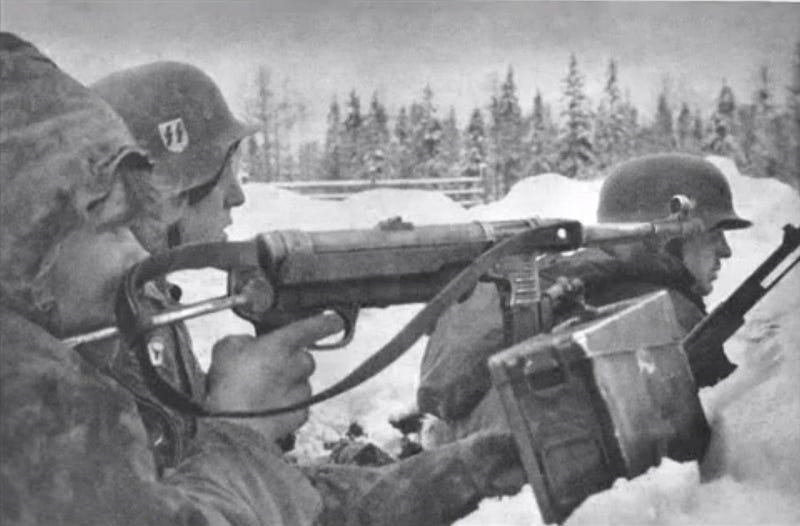
(above) A document from the Wannsee conference that lists all the Jews in each country. Estonia (“Estland”) is declared “Judenfrei” (Free of Jews). That did not happen by itself, but rather with the enthusiastic help of the Estonians. {Source: Holocaust in Ukraine via Twitter/X]
NATO’s 2004 expansion changed everything
The mad rantings of the Baltic leaders like Kallas are ony possible because of yet another massive foreign policy failure by George W. Bush.
Immediately upon moving into the White House, the Bush Administration set about effecting the fifth — and by far the largest — expansion of NATO, which took place on March 29, 2004.
On that day, Bulgaria, Estonia, Latvia, Lithuania, Romania, Slovakia and Slovenia formally became members of NATO by depositing their instruments of NATO accession with the US Government, which is the depository nation for the Treaty.
Since then, these states have become increasingly anti-Russian in both words and deeds, while becoming aggressively “pro-conflict” towards Russia and Putin.
Bush’s “Bucharest Nine”
In my first article of this series, “NATO is a Dangerous Farce — and We All Know It”, I described how the leaders of nine countries from “NATO’s eastern flank” joined together in 2015 to create what they called“NATO’s enhanced forward presence, from the Baltic to the Black Sea”.
Led by the Prime Ministers of Poland and Romania, they call their group the Bucharest Nine (aka “B9”) — a reference to that great NATO expansion event in 2004. The members are: Bulgaria, the Czech Republic, Estonia, Hungary, Latvia, Lithuania, Poland, Romania and Slovakia.

Be careful what you wish for
No doubt the goofballs in the Bush Administration thought they were being exceedingly clever when they added all those ex-Soviet states to NATO. They were increasing NATO’s border with Russia and could now station troops and missile batteries just a few minutes’ flight time from Moscow.
No doubt they were slapping themselves on the back about all the anger and frustration they were causing the Kremlin.
Unfortunately, like so many of their disastrous misadventures, Bush’s Great NATO Expansion of 2004 had a massive downside.
The formation of the Bucharest Nine added a whole new contingent of NATO members who were literally rubbing their hands together at the prospect of finally “making Russia pay”.

These Eastern European states are constantly “baiting” Russia. Kaja Kallas is just one example. The PMs and Foreign Ministers of all the Baltic States are like constantly barking chihuahuas, actively calling for NATO to intervene in Ukraine, demanding the arrest (or worse) of Vladimir Putin, the “decolonisation” and break up of the Russian Federation, and so on.
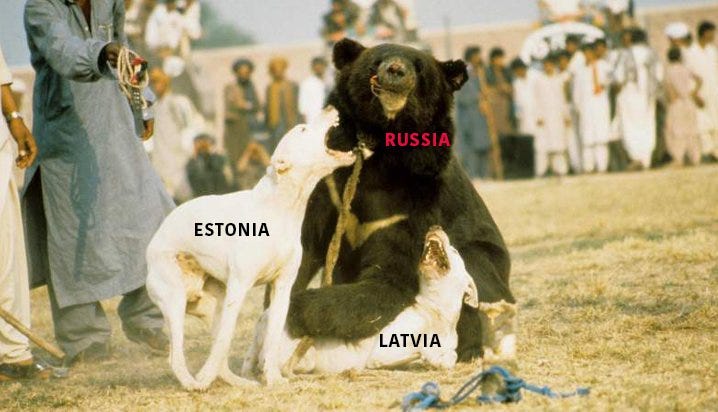
Alas, they do not seem to have grasped the simple fact that, with the fall of the USSR and the dissolution of the Warsaw Pact, NATO has shrunk and is no longer the military powerhouse it was during the Cold War.
And — most importantly — the United States is NOT prepared to back up its European NATO allies as it once was.
No fear of nukes
At a recent conference, Kaja Kallas warned about falling into a “trap of fear”, saying that Europeans should not be afraid of Putin’s nuclear threats:
“Fear holds us back from supporting Ukraine. Countries have different fears, such as fear of nuclear escalation, migration, or conflict escalation. We must not fall into the trap of fear, as this is exactly what Putin wants. He wants us to be afraid…
“Russia wants to sow fear in our societies.”
I grew up learning to “duck and cover” in school. I was alive when JFK almost started a nuclear war in 1962. I think a healthy fear of “nuclear escalation” is a good thing.
Kaja Kallas does not.
She even told Sky News: “Russia is saying this or that step is escalation, but defence is not escalation. I’m saying we should have all options on the table”.
In fact, Kallas believes that Russia is the one who has something to fear, and that “Putin is afraid of a war with NATO”.
Worse yet. her breezy dismissal of the Russian nuclear threat was echoed by Peter Stano, a foreign policy spokesman for the European Commission. “Putin is doing a nuclear gamble”, Stano sniffed. “He’s using the nuclear element as part of his arsenal of terror, it’s unacceptable”.
In response to Putin’s threat of using nukes, Poland — another Russophobic NATO member — has actually doubled down on escalation. They have asked Washington to house US nuclear weapons on Polish territory. The country’s regional authorities also announced that they have been working to establish supplies of potassium iodide tablets and distribution points for them in the case of a nuclear emergency.

“Russia hasn’t changed”
Most people agree that communism is dead, and that today’s Russian Federation is radically different from the USSR under Stalin.
Kaja Kallas, however, is NOT one of those people.
Kallas refuses to admit that today’s Russia is any different than the Stalinist Soviet Union. “Russia hasn’t changed,” she said last year on marking an anniversary of the forced deportations of 1949. “This evil lives on in Russia.”

Her father was foreign minister when Estonia began negotiations to join NATO, and Kallas told TIME Magazine that at a time when the Soviet Union had just collapsed, the petition raised a lot of questions. “He was frequently asked, ‘Why do you need this? Russia does not pose a threat anymore,’” Kallas recalls. “Well, we knew our neighbor then, and we know our neighbor now.”
Does Kallas have daddy issues?
Still, her feelings towards Soviet Russia may be more complicated. While her mother and grandmother were persecuted by the USSR, her father was a powerful player in the Soviet sphere. Siim Kallas was a high-ranking member of the Communist Party of the Soviet Union from 1972 to 1990, worked at the Ministry of Finance of the Estonian SSR, and headed local branches of Sberbank. During Perestroika, he was a deputy of the Supreme Soviet of the USSR — the highest state body of authority in the Soviet Union.
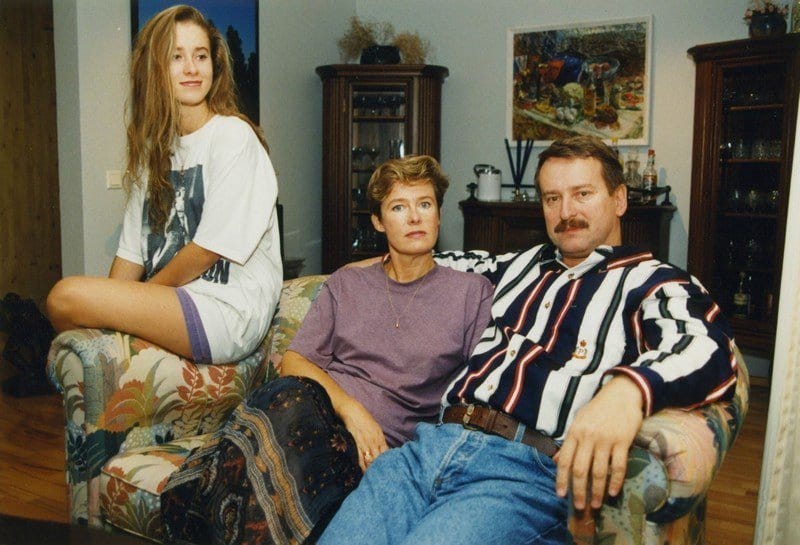
Strange, then, that she should harbour such animosity towards the entity which made her father so successful and which gave her a fancy, privileged life.
That life continued in the post-Soviet era. Siim Kallas served two five-year terms in the European Commission, from 2004 to October 31, 2014. In January 2015, he signed on as a “special adviser” to Latvian Commissioner Valdis Dombrovskis, providing him with “strategic and political advice on the future of the [Economic and Monetary Union] and economic relations with [the] Eastern neighborhood,” according to a Commission document.
Despite her father’s “history” with Russia, Kaja Kallas is disdainful of those who would treat Russia with any deference or consideration, as she sees them as failing to see the “evil” that is Russia and Russians. Indeed, she told the Financial Times that “there is a certain naivety towards Russia” among her EU colleagues, and she is determined to overcome that.
Many if not most Baltic State citizens agree with Kallas.
It is thus no surprise that the Baltics have been by far the most bellicose when it comes to arming and supporting Ukraine in their conflict with Russia.
Kallas is on a Kremlin hit list
Kallas herself is actually on a “wanted list” for prosecution in Russia because she ordered the destruction of monuments honouring the Red Army soldiers who died fighting the Nazis in Estonia.

I should note that such desecrations are also happening in other Eastern European countries, such as Lithuania and Poland. Meanwhile, commemoration ceremonies, marches and monuments to Nazi collaborators and Waffen SS soldiers are springing up all over the Baltics, like mushrooms after a spring rain.
Pursuing war with a “liberal” agenda
Kallas — like other “woke” leaders in Eastern Europe, is actively working against the will of her people in pursuing the seemingly incongruous “Western” policies of cultural progressivism combined with foreign militarism, despite push back from their people.
She is particularly unpopular because she raised taxes significantly so that Estonia could send more aid to Ukraine.
In fact, Kallas’s approval rating is now at a miserable 16% — the lowest rating ever recorded since the poll began.

But Kallas, undeterred, is doubling down on her Russophobic rhetoric. While speaking at the recent Lennart Meri Security Conference in Tallinn, Kallas even suggested that Russia should be broken up into smaller states, and the people given “self-determination”.
In promoting this idea, Kallas is showing herself to be a good foot soldier for Washington. As I have noted in a previous article, this objective of “decolonising” Russia is a major policy mission of the United States:
Indeed, the need to “defeat Russia” has been repeated over and over by almost all the EU leaders, not just by Kallas, but also by Polish President Andrzej Duda, who also called for “decolonising” Russia at the recent Ukrainian “Peace Summit”.

But Kallas is especially worth noting, because she is not content just to go after the Russian Federation. While speaking in Tallinn, she also gave a “key message” quote that focused on Putin himself:
”Russia must be held accountable. There can be no impunity. No immunity. A year ago, it was thought unimaginable that Putin would be issued an arrest warrant by the ICC. Just six months ago, most were not prepared to publicly support the idea of a special tribunal for crimes of aggression, now we are at the point of no return.”
For Kallas, “peace is not the goal” in Ukraine
“Peace can’t be the ultimate goal,” Kallas told The New York Times in 2022. “We had peace after the Second World War, but the atrocities for our people started or continued then,” she said, citing mass deportations, killings of the elite and “trying to erase our culture and our language.”
Instead, Kallas is insisting on ultimate victory over Russia, claiming that “there is no plan B”.
An EU Foreign Policy chief that hates Putin
Such comments are significant, because Kallas has been appointed to be the EU’s next Foreign Policy head despite her personal Russophobia, bigotry and open animus towards Putin.
Her appointment further indicates the provocative posture that the Europeans are adopting towards their Russian neighbour.
The High Representative of the Union for Foreign Affairs and Security Policy is also Vice President of the European Commission chairs regular meetings of the EU’s 27 foreign, defense and development ministers, and represents the EU at G7 and G20 ministerial meetings.
In order to get the position of EU’s top diplomat and security czar, Kallas was approved by the 27 heads of the EU member states. This means that everyone is OK in having the bloc’s “biggest Russia hawk” in that job as the EU’s top diplomat.
And the fact that Kallas would literally be arrested if she ever travelled to Russia does not indicate any serious intent by the EU on “getting along” with Russia in the future.
Joining Old and New Europe
In her campaign to “make Russia pay”, Kaja Kallas has found an unlikely ally in France’s Emmanuel Macron.
The French President is widely known to have pulled strings to get Kallas appointed to the EU’s top foreign policy and security position.
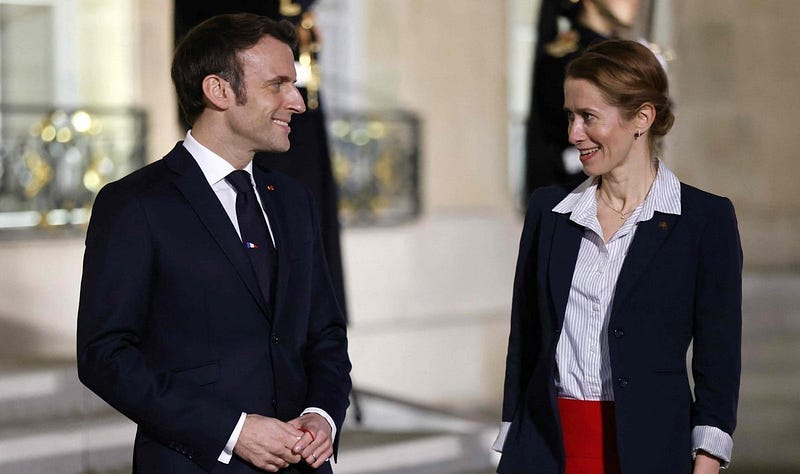
When it comes to Russia, Macron often vacillates between conciliation and confrontation. His partnering with Kallas, however, may indicate that he is settling on a more combative stance towards Putin.
In any case, the two officials, representing East and West, Old and New Europe, make a formidable pair — one that I will explore more fulsomely in my next article.
UP NEXT: NATO is a Farce, Part 5: France and Estonia Form an “Axis of War”
#End
If you liked this post, please consider leaving me a tip! Donations support my independent, ad-free writing.
============================================================================







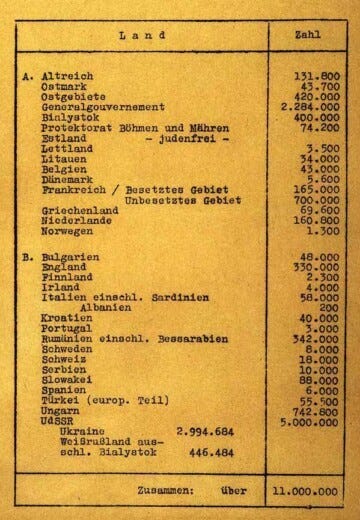






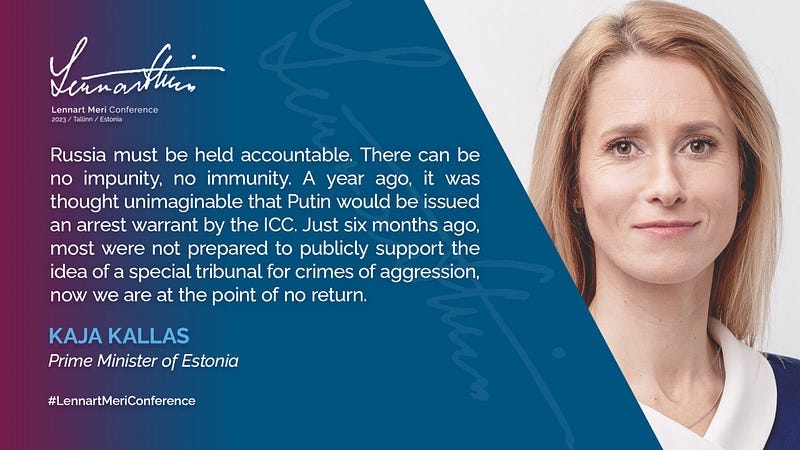
“..,,.. In response to Putin’s threat of using nukes, Poland — another Russophobic NATO member — has actually doubled down on escalation. They have asked Washington to house US nuclear weapons on Polish territory. The country’s regional authorities also announced that they have been working to establish supplies of potassium iodide tablets and distribution points for them in the case of a nuclear emergency…..”
The new step of allowing US to put nukes on several sites has also been done by several other member countries in NATO recently. And the thing with the iodine tablets Norway distributed these in schools a year or two ago right after allowing the U.S. to bring nukes.
So these countries have leaders that know this step of agreeing to be the one pointing nukes at Russia can result in them being targeted and hit by nukes - and their population annihilated. - and they still do it. Insane.